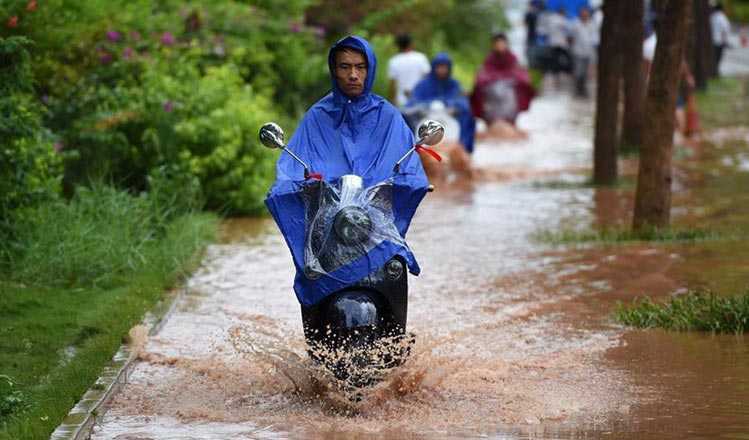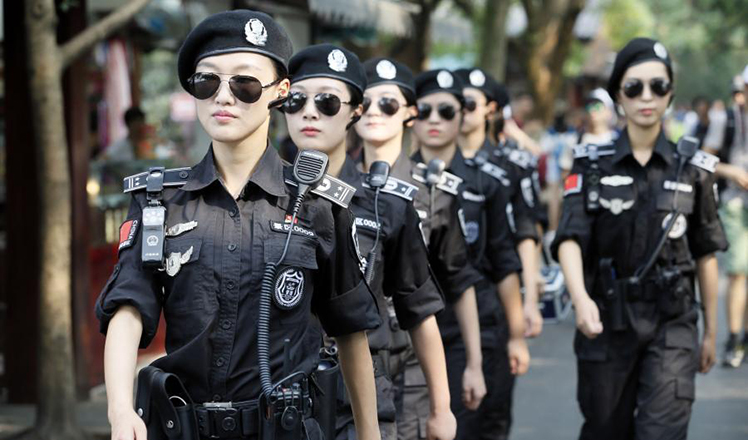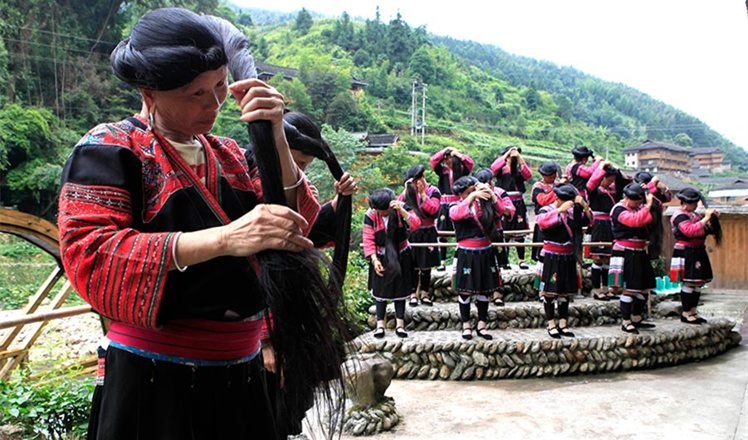Dongting Lake cleans up its act with fertilizer ban
Updated: 2016-08-04 12:30
(Xinhua)
|
||||||||
CHANGSHA -- Dongting Lake in central China is a quiet place these days: a sign by the lake reads, "No Fertilizer."
This forms a sharp contrast with summer scenes from 2014 when boats would clutter the lake, carrying fishermen as they fed the fish.
"Sometimes they poured in as much as 100 tonnes of fertilizer in a single day," said Xu Haijun, general manager of the Shanpo Lake fishery.
Dongting Lake is China's second largest freshwater lake. Fertilizer thrown into the lake over many decades has boosted the growth of highly-invasive water hyacinth, as well as polluting the water.
"During the worst periods, the water turned dark and smelly," Xu said.
Since 2014, fisheries near the lake in counties such as Anxiang, Taoyuan and Linli, in Hunan Province, were ordered to stop feeding the fish with fertilizer.
As a result, fishermen began planting water grass and putting algae in the water to feed the fish instead.
Their efforts paid off. In the past two years, water quality has improved from level five, the worst on a five-tier assessment scale, to level three, which means the water is acceptable for drinking and swimming.
But the ban on fertilizer reduced the amount of fish.
"Fertilizer could speed up growth of the fish," said Xu Haijun. "Now we can only allow them grow naturally."
Output of fish before the ban was close to 2 million kilograms per year. Last year the number dropped by half a million kilograms, and revenues fell by more than 6 million yuan (about 900,000 U.S. dollars).
More than 200 households from the Shanpo Lake fishery saw their annual income decrease to 50,000 yuan last year, 20,000 yuan lower than the previous year, Xu told Xinhua.
Measures have been taken to make up for the loss. Fish from the lake are now labelled as "organic," which commands a price two yuan per kilogram higher. Shanpo Lake fishery has also planted lotus flowers in the water to attract tourists.
Sponsored by the local fishery, Cao Jingxin, a 40-year-old fisherman, who started fishing as a teenage boy, spent more than 100,000 yuan to renovate his house: it is now a family inn.
"I work in a fishery, so surely I can cook fish," he said. "My cooking skill is as good as a chef."
A further 12 households have also started to run family inns to make money.
At the same time, however, some fishermen note that the water quality is not stable, especially on rainy days when sewage washes into the lake.
"Improvement of water quality in a lake is a big project and we need comprehensive remediation," said Gao Dali, vice head of the managing bureau of East Dongting Lake national natural reserve.
"We hope that the government can give subsidies and incentives to fishermen, so as to encourage more people to protect the water in Dongting."
This forms a sharp contrast with summer scenes from 2014 when boats would clutter the lake, carrying fishermen as they fed the fish.
"Sometimes they poured in as much as 100 tonnes of fertilizer in a single day," said Xu Haijun, general manager of the Shanpo Lake fishery.
Dongting Lake is China's second largest freshwater lake. Fertilizer thrown into the lake over many decades has boosted the growth of highly-invasive water hyacinth, as well as polluting the water.
"During the worst periods, the water turned dark and smelly," Xu said.
Since 2014, fisheries near the lake in counties such as Anxiang, Taoyuan and Linli, in Hunan Province, were ordered to stop feeding the fish with fertilizer.
As a result, fishermen began planting water grass and putting algae in the water to feed the fish instead.
Their efforts paid off. In the past two years, water quality has improved from level five, the worst on a five-tier assessment scale, to level three, which means the water is acceptable for drinking and swimming.
But the ban on fertilizer reduced the amount of fish.
"Fertilizer could speed up growth of the fish," said Xu Haijun. "Now we can only allow them grow naturally."
Output of fish before the ban was close to 2 million kilograms per year. Last year the number dropped by half a million kilograms, and revenues fell by more than 6 million yuan (about 900,000 U.S. dollars).
More than 200 households from the Shanpo Lake fishery saw their annual income decrease to 50,000 yuan last year, 20,000 yuan lower than the previous year, Xu told Xinhua.
Measures have been taken to make up for the loss. Fish from the lake are now labelled as "organic," which commands a price two yuan per kilogram higher. Shanpo Lake fishery has also planted lotus flowers in the water to attract tourists.
Sponsored by the local fishery, Cao Jingxin, a 40-year-old fisherman, who started fishing as a teenage boy, spent more than 100,000 yuan to renovate his house: it is now a family inn.
"I work in a fishery, so surely I can cook fish," he said. "My cooking skill is as good as a chef."
A further 12 households have also started to run family inns to make money.
At the same time, however, some fishermen note that the water quality is not stable, especially on rainy days when sewage washes into the lake.
"Improvement of water quality in a lake is a big project and we need comprehensive remediation," said Gao Dali, vice head of the managing bureau of East Dongting Lake national natural reserve.
"We hope that the government can give subsidies and incentives to fishermen, so as to encourage more people to protect the water in Dongting."
- Fire guts Emirates jet after hard landing; 1 firefighter dies
- Egypt's Nobel-laureate scientist dies of illness in US
- THAAD muscle flexing unmasks anxiety over declining hegemony
- British police say mental health a significant factor in London knife attack
- Paragliding fans fly over Rigi mountain in Switzerland
- DPRK fires 1 ballistic missile into east waters

 After Typhoon Nida, torrential rain hits S. China
After Typhoon Nida, torrential rain hits S. China
 World's fastest bullet train to start operating next month
World's fastest bullet train to start operating next month
 Serbian artist creates incredible 3-D art
Serbian artist creates incredible 3-D art
 Glimpse into the work and life of G20 guards
Glimpse into the work and life of G20 guards
 Shopping and throwing Frisbee in virtual reality
Shopping and throwing Frisbee in virtual reality
 Take a closer look at the life in Rio Olympic Village
Take a closer look at the life in Rio Olympic Village
 From dusk to dawn: The other side of Beijing
From dusk to dawn: The other side of Beijing
 Huangluo: China's 'long hair village'
Huangluo: China's 'long hair village'
Most Viewed
Editor's Picks

|

|

|

|

|

|
Today's Top News
US launches airstrikes against IS targets in Libya's Sirte
Ministry slams US-Korean THAAD deployment
Two police officers shot at protest in Dallas
Abe's blame game reveals his policies failing to get results
Ending wildlife trafficking must be policy priority in Asia
Effects of supply-side reform take time to be seen
Chinese State Councilor Yang Jiechi to meet Kerry
Chinese stocks surge on back of MSCI rumors
US Weekly

|

|







